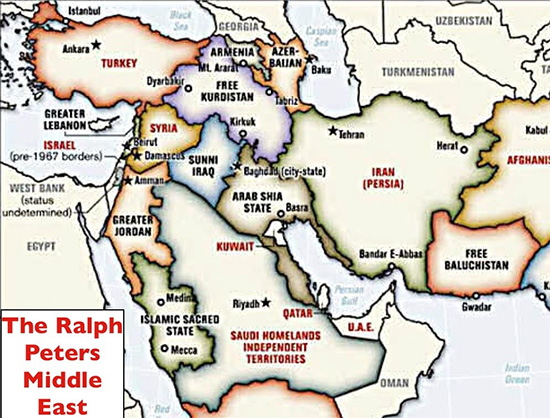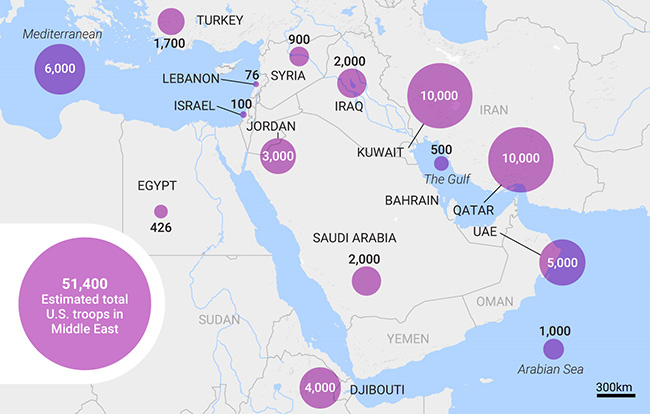 A map of the redrawing of the Middle East, made at the Pentagon in the early 2000s by Colonel Peters.
A map of the redrawing of the Middle East, made at the Pentagon in the early 2000s by Colonel Peters.
…Iran, the last target on the Pentagon’s list, is now fully in the cross-hairs. Deprived of allies in Syria, and now largely cut off from its Hezbollah allies in Lebanon, Tehran is as vulnerable as it has ever been, stresses Jonathan Cook, an award-winning British journalist based in Nazareth, Israel, for 20 years and returned to the UK in 2021; in 2011 he was awarded the Martha Gellhorn Special Prize for Journalism.
The long-harboured aspirations of the US, Turkey and Israel to topple the Syrian government, mainly through their rebranded al-Qaeda (banned in Russia) allies, succeeded at lightning speed, writes
Damascus fell days after Hay’at Tahrir al-Sham (HTS) forces (banned in Russia) under Abu Mohammad al-Jolani surprised observers by breaking out of their small North-Western enclave in Syria and seizing the country’s second city, Aleppo.
Bashar al-Assad’s government and his army, it turned out, were paper tigers. Or they were, once their chief allies – Russia, Iran and Hezbollah in Lebanon – had been forced onto the back foot. Preoccupied with troubles closer to home, they could no longer offer the military support Assad depended on.
Israel’s rampage across Lebanon and its military intimidation of Iran – as well as NATO’s increasing efforts to pin Russia down in Ukraine – unfroze the main battle lines in Syria, arrived at several years ago between Assad’s army, al-Qaeda’s franchise in Syria and Kurdish forces in the north-east.
Backed by Turkey, a member of NATO – and more covertly by the CIA and MI6 – HTS and the so-called Syrian National Army (SNA) were able to drive south unhindered.
HTS is proscribed as a terrorist group by both the US and Britain. The CIA has placed a $10m bounty on Jolani’s head.
Strangely, amid the excitement, the BBC and the rest of the western media forgot to mention HTS’s status as a proscribed organisation – as they do in kneejerk fashion every time the Palestinian resistance group Hamas is referred to.
Notably, the very western politicians and media now celebrating the “liberation” of Syria by HTS are the same ones insisting that the eradication of the “terrorists” of Hamas in Gaza is so important it justifies the bombing and starvation of the enclave’s two million-plus Palestinian population.
There are difficult questions that any rational observer ought to be pondering right now.
Wesley Clark, a former US Army general, recalled a moment weeks after the 9/11 attacks on the Twin Towers in 2001 when he visited the Pentagon.
He was shown a classified document that set out how the US was going to “take out seven countries in five years, starting with Iraq, then Syria, Lebanon, Libya, Somalia, Sudan and finishing off with Iran”.
None of these states had any obvious connection to the events of 9/11. The one that did have such a connection – Saudi Arabia – was not on the list and has remained one of the United States’ most favoured client states.
The order of targets prioritised by Washington had to be modified – and the timeline was way off – but the realisation of that 2001 blueprint is closer than ever.
The invasion of Iraq in 2003 by the US and UK, on false pretences, led to the removal of dictator Saddam Hussein and the collapse of the Iraqi state. The country was plunged into a devastating sectarian war from which it is still struggling to recover.
NATO meddling in Libya, again on false pretences, led to the removal of dictator Muammar Gaddafi and the collapse of the Libyan state in 2011. It has been a failed state run by warlords ever since.
Sudan and Somalia – the latter subject to a US-backed Ethiopian invasion in 2007 – are both basket cases, riven by all-consuming, horrifying civil wars that the US helped to stoke rather than resolve.
Turkey’s open backing of the rebels in Syria – plus more concealed support from the CIA and MI6 – led to the removal of Syrian dictator Assad at the weekend and the collapse of what was left of the Syrian state. It is hard to imagine a unified authority emerging there.
Iran, the last target on the Pentagon’s list, is now fully in the cross-hairs. Deprived of allies in Syria, and now largely cut off from its Hezbollah allies in Lebanon, Tehran is as vulnerable as it has ever been.
None of this is accidental.
 multimedia.scmp.com
multimedia.scmp.com
Were western publics not so deeply influenced by years of disinformation from their politicians and media, they might by now be starting to see a bigger picture gradually coming into focus.
One in which the fates of Syria, Lebanon, Palestine and Iran hang in the balance together. One in which the western powers, led from Washington, are once again meddling, in violation of international law, to destroy the territorial integrity of each of them. One in which Israel and the West’s geostrategic interests are paramount, not the freedoms or welfare of the region’s people.
Dictators are bad. Killing civilians is bad. But these truisms, selectively prioritised by our feckless media class, have been weaponised to obscure the wider picture.
When westerners see “enemy” governments fall, as Assad’s has just done, or civil wars break out in far-off lands, they are led to assume that these are the geopolitical equivalent of a natural event.
Such changes of power, westerners are encouraged to believe, only ever rise from the bottom up, signalling a dictator’s illegitimacy, or maybe the incremental trajectory of political systems from backwardness to greater enlightenment.
Sadly, world events – especially in circumstances where there is only one military superpower, the US, with some 750 bases around the globe – rarely follow such a straightforward path.
The 2001 Pentagon memo shown to Clark was, in fact, a reworking of a military blueprint for the Middle East that had been circulating in Washington for even longer – and had nothing to do with responding to 9/11 or terrorism.
It was all about securing Israel’s place as a forward base for US interests in the oil-rich region.
The champions of this idea were an increasingly influential group called the neoconservatives – or neocons for short.
Syria was viewed by the neocons and Israel as the lynchpin, the supply line, between Iran and Hezbollah, Tehran’s critically important military ally in Lebanon. Severing that link was a priority.
Ultimately, Israel realised there was no way to complete its genocide of Gaza without neutralising Hezbollah and Syria, and containing Iran.
So how involved in practice was Washington in Assad’s fall?
There are plenty of clues marking the way.
After Israel’s 2006 failure, the US looked for a new route to reach the same destination. Operation Timber Sycamore was born in secret shortly after the Arab Spring erupted in 2011.
This covert military operation was designed to work in conjunction with an increasingly draconian sanctions regime to throttle the Syrian economy.
The CIA, supported by Britain’s MI6, began working in secret to topple Assad. Saudi Arabia was intimately involved too, presumably because of its deep ties to extreme jihadist groups across the region, including al-Qaeda and Islamic State (banned in Russia), that would soon become central to the regime-change operation.
Jake Sullivan, now Joe Biden’s national security adviser, was clear about who was going to help. In an email in late 2012, as Timber Sycamore was being put together, he wrote to then Secretary of State Hillary Clinton to avoid any confusion about Washington’s allies: “AQ [al-Qaeda] are on our side in Syria.”
Rather than viewing the world in simplistic terms as a battle between good and evil – one in which the evil ones suddenly become good guys, if the BBC says so – analysts of international affairs have traditionally used a different framework.
They understand world affairs as taking place on a global, geostrategic chessboard, in which the great powers of the day try to checkmate their rivals, or avoid being checkmated.
Surprises happen, as they do in chess, when a player doesn’t foresee, or can’t evade, the next move of its opponent.
Syria, very obviously, is not a great power. It is a pawn. But a critically useful one, nonetheless. As critically useful as Ukraine. The battlefields may look separate, but they are, of course, on the same chessboard.
And the players – the US, Russia and China, and to a lesser extent Iran, Israel and Turkey – must each use these pawns wisely to advance their strategic goals.
Israel is the big winner of this round. Syria emerges broken from its long years of a proxy civil war and western sanctions. Either it will collapse into further sectarian discord, consuming all its energies – Israel can readily meddle to inflame such tensions – or its new government will seek rehabilitation from the West. A peace accord with Israel would doubtless be the entry requirement.
With Syria removed from the “axis of resistance”, Hezbollah in Lebanon has been severed from Iran, leaving both Israel’s surviving, main regional foes isolated and weaker. And in the process, Israel has opened the way to completing its genocide of the Palestinian people undisturbed.
Turkey’s interests in Syria do not conflict with Israel’s or Washington’s. It wants to return to Syria the millions of refugees it currently hosts and to eliminate any base for Kurdish factions in Syria to ally with, and assist, its own Kurdish resistance groups.
In this “game”, there are no good guys. There are only power plays. And the US has far more pieces on the board: 750 military bases encircling the globe to impose by force a policy of “full-spectrum dominance”.
Russia’s new advanced missile systems, the hoped-for deterrence of its nuclear arsenal, its alliances of convenience with others threatened by the undeclared US empire – chiefly China and Iran – are its remaining strengths.
Iran, now isolated from allies in Syria and Hezbollah in Lebanon, will have to think what other resources it can bring to the game. The voices calling for it to forego religious scruples and develop a nuclear weapon, to neutralise Israel’s existing arsenal, will grow much louder.
And, finally, China is only too aware that, in seeking to weaken and isolate Russia and Iran, the US is ultimately gunning for it. There can be no “full-spectrum global dominance” until China is cornered – until Washington can declare, “checkmate”.
read more in our Telegram-channel https://t.me/The_International_Affairs

 9:49 21.12.2024 •
9:49 21.12.2024 •






















